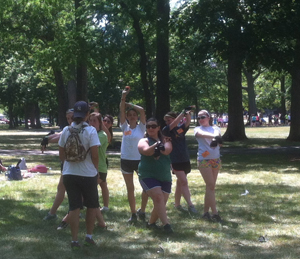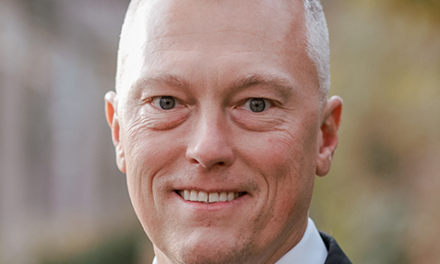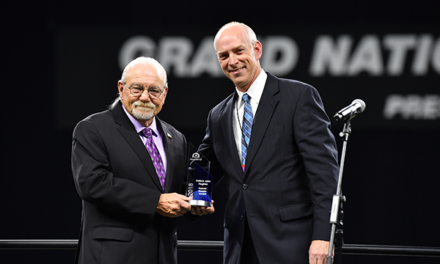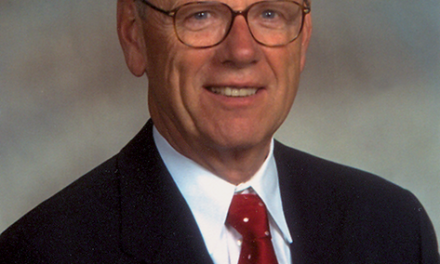Day two of the full week MFA Summer Symposium is coming to a close, and we’ve had a great start to camp! Today in the afternoon, I was able to take a break from my responsibilities in our staff headquarters to head out and watch some sessions.
First, I walked over to the quad to observe color guard students in their Equipment Technique and Repertoire teams. Students were rehearsing in small groups for their final performance on Saturday. I walked across the quad and stopped to watch several groups, including two groups tossing flags and another learning a dance routine. One group was working with flags and practicing a lyrical section of their routine, which was quite beautiful to watch.
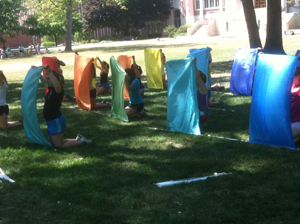 I stopped to chat with two students during one of their water breaks. I asked Whitney, a student from Kansas, if she was enjoying her experience at Summer Symposium. She said yes, and I asked what she enjoyed the most. “Everything! It’s just all fun,” Whitney said.
I stopped to chat with two students during one of their water breaks. I asked Whitney, a student from Kansas, if she was enjoying her experience at Summer Symposium. She said yes, and I asked what she enjoyed the most. “Everything! It’s just all fun,” Whitney said.
I also chatted with Edyn, a second-year camper from Ohio. I asked if she could give me some details about what they were working on. “It’s a dance and routine for our show-and-tell performance on Saturday,” she said.
“It’s nice to see [and meet] these people,” Edyn said. “Since I live quite a long way away from most.”
Edyn lives in Ohio, and she said she has made friends with several students who live in Michigan.
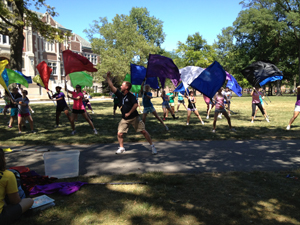 I observed for a couple more minutes as one of the small flag groups performed a full sequence from their routine to music. Then I decided to visit the Directors’ Academy for a little while.
I observed for a couple more minutes as one of the small flag groups performed a full sequence from their routine to music. Then I decided to visit the Directors’ Academy for a little while.
I walked over to sit in on a session with Mark Buselli, Jazz Band Division Coordinator and Director of Jazz Studies at Ball State University. I made it in time for the second half of his session, and he was deep in conversation with the attendees. This session was smaller and more intimate, which allowed directors the chance to truly have in-depth conversations about their individual situations.
The session was called “Preparing Your Band for a Jazz Festival,” and Buselli chatted with the directors present to give advice and answer questions about how to improve their respective jazz programs.
One high school director participant was discussing how she has volunteered to work with a middle school jazz program. It has definitely added a lot to her plate, but it was clear from the conversation that it’s important to her that the program not only stays alive, but also thrives.
“At first when you said you volunteered, I thought, ‘oh, this poor girl,’” Buselli said. “But, then I thought – that’s your feeder school, that’s brilliant! I think you’re very smart and on the right track.”
Buselli was very encouraging and helpful as he discussed the unique situations each of these teachers faces in their day-to-day work. He also talked about why teaching can be so satisfying, and it was inspiring to see the excitement in his face, and hear it in his voice, as he discussed this.
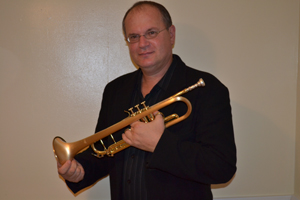 “As a teacher, I’ve come to the conclusion that I don’t care what level I teach, I teach to see the process,” Buselli said. “Young students – you can see so much progress over a short amount of time.”
“As a teacher, I’ve come to the conclusion that I don’t care what level I teach, I teach to see the process,” Buselli said. “Young students – you can see so much progress over a short amount of time.”
Buselli also talked about the concept of active listening versus passive listening. He discussed an exercise teachers can use in the classroom. Buselli said to take five minutes of focused time and ask, “What is the bass player doing? How is the horn interacting with the piano player?” This is a way to focus on active listening and help students see that there’s more going on than just background music.
I took a moment at the end of the session to thank Mr. Buselli, and he also passed along a handout with some words I enjoyed reading. I left with these words in hand and contemplated them for a while today so it seems appropriate to leave them with you as well:
The Sweetness of Music
“As we approach a new century and a changing international economic climate, we think that scientific and technological education should be our highest priority. And yet these fields, at least the way they are practiced today, only tangentially affect the heart and soul, where morality and values are rooted, while music goes right to the heart.
Studying music, one learns about talent, thought, work, expression, beauty, technique, collaboration, aesthetic judgment, inspiration, taste, and a host of other elements that shape life in all its aspects. As we learn to control our fingers, lips, and breath in making music, subliminally, music is shaping us, making us people of sensitivity and judgment.”
-From Thomas Moore’s 1996 book: The Re-Enchantment of Everyday Life
Musically,
Kristin
